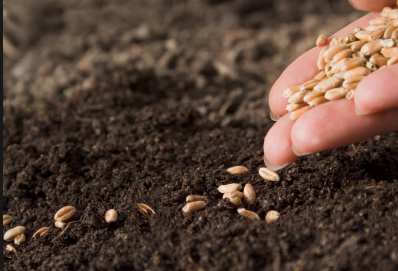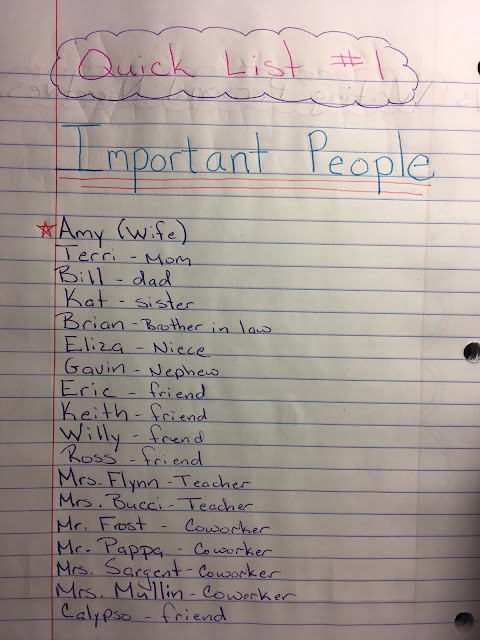Good Morning 6th Graders,
Today is a 'D' Day. Make sure you use the bathroom & sharpen your pencils. Check to see that you have everything you need for your morning classes.
Thank you
Mr. Trumble
ELA:
Do Now:
Today is a 'D' Day. Make sure you use the bathroom & sharpen your pencils. Check to see that you have everything you need for your morning classes.
Thank you
Mr. Trumble
ELA:
Do Now:
- Write tonight's homework down in your agenda
- Take out Journal Entry #3
Homework:
- Write 3 different Leads for your Seed Idea (All 3 together should be approximately 1-2 pages in length)
Writers Workshop Session #4
Standards:
- W6.3 - Write narratives to develop real or imagined experiences or events using effective technique, relevant descriptive details, and a well structured sequence of events
- W6.4 - Produce clear and coherent writing in which the development, organization, and style are appropriate to task, purpose, and audience
Part 1 - Collaboration & Evaluation
(You do: 10 minutes)
Directions: Share your second journal entry with a writing partner (You choose your own partner. For each journal entry you will pick a different partner.)
With your partner: (Discuss any of the following)
- Identify the things that "WOW' you.
- Share your thoughts and feelings
- Discuss any connections you make to your partners writing
- Look for figurative language: personification, simili, metaphor, hyperbole, alliteration, idioms, & onomatopoeia
- Analyze the characters? What do you know about them?
- Identify the setting? Did the writer develop a setting?
- Analyze the elements of plot. Is there an exposition, inciting incident, rising action, climax, falling action, or resolution?
- Look for conflicts. Can you identify what types of conflicts the author included?
- Analyze the mood & tone of the journal entry.
- Can you identify a theme? If so, what is the theme?
- Did the writer write about a small moment, or did they summarize?
As we grow as writers, it is important that we analyze our writing, but that we can practice writing without judgement. In this way we don't worry about what others will think or how we will be evaluated. I will eventually evaluate your final piece, but just like a coach has practices with their players before the "Big Game" I want you to think of these journal entries as "practice" and I want you to take risks, and try new things with your writing without worrying about getting a good grade.
**********************************************
It is also important that we continue to have an environment of respect for all. Remember what Lucy Calkins said about your writing, Honor your writing, and honor each other's writing!
"Read it like it's Gold!"
**********************************************
Follow Up Whole Group: - Does anyone want to share about the discussion you had with your writing partner?
- What did you speak about?
- How has your writing improved since your 1st entry?
- What do you still need to work on?
Part 2 - Picking a Seed Idea
(We do - 15 Minutes)
Writers, today is an exciting day! Today instead of generating new personal narratives, you will need to look over your collection of stories and choose just one.
Writers often call that a...
 |
Seed Idea...meaning you will nourish and grow that seed idea into a published piece of writing. |
It can be daunting to wrap you mind around all you have written and choose just 1.
This is the time when you have to really pay attention to the little voice as you reread. Find the one that whispers to you that there is just something about this story, that this story idea has the potential to become a really important piece of writing. Try to find one that has strong meaning to you. Remember, that does NOT mean that the personal narrative is already an incredible piece of writing. It might just be an idea that you think you can develop into a powerful and meaningful story.
Reread the 3 entries you have written and start to notice which stories could be your seed idea.
Writers, you will get a paper clip to mark your seed idea.
Congratulations, writers, and welcome to your seed idea.
Now...
Now...
Part 3 - How to Write a Good Lead
(We do - 15 Minutes)
Today I want to teach you that writers also prepare
to write powerful narratives by trying out several different leads.
Writers, you know how much the first sentences, or paragraphs of a story, matter. We call this the lead. The 1st bit of text on a page has a BIG job of grabbing the reader's attention, making the reader want to put everything else aside so he can just read, read, read.
Think about Freak the Mighty: I Never had a brain until Freak came along, and that's the truth, the whole truth. The unvanquished truth is how Freak would have put it.
Think about Freak the Mighty: I Never had a brain until Freak came along, and that's the truth, the whole truth. The unvanquished truth is how Freak would have put it.
Authors try out different leads, looking for the one that will set them up to write a great story.
4 Ways to Write a Good Lead
1. The Dialogue Lead - uses dialogue between characters
2. The Inner Thinking Lead - shows what a character is thinking
3. The Small Detail Lead - describes the small details of the scene
4. The Action Lead - describes precise character actions
1. The Dialogue Lead - uses dialogue between characters
2. The Inner Thinking Lead - shows what a character is thinking
3. The Small Detail Lead - describes the small details of the scene
4. The Action Lead - describes precise character actions
**Look at my examples**
Writers, I want you to think about the beginning to your story, and try a few different leads:
Your Task: Write a few different leads to your story. Think... what is my story really about. What leads will work best for me.
Once you have tried at least 3 different leads, you might find that you can combine them to make a really strong start to your story.
Share: (***If Time***) Partners read your best lead in your best storytelling voice. Listen for how the writer grabs you and makes you want to hear the rest of the story.
We will begin Writer's Workshop Session #5 on Monday by picking a 4th writing partner and sharing the leads that we wrote for our narrative, so it is very important that you do your best. Honor your writing. Write like it's Gold
RTI - D Day
Standards:
- W6.3 - Write narratives to develop real or imagined experiences or events using effective technique, relevant descriptive details, and a well structured sequence of events
- W6.4 - Produce clear and coherent writing in which the development, organization, and style are appropriate to task, purpose, and audience
Writing Strategy: Quick Write - Try different leads for your narrative
Directions: Practice developing a strong lead for your narrative.
Write:
Directions: Practice developing a strong lead for your narrative.
Write:
- A dialogue Lead
- An Inner Thinking Lead
- A Small Detail Lead
- An Action Lead
















